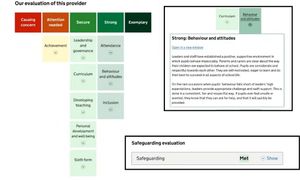What Ofsted changes could mean for parents - including new school 'report cards'
How inspectors present their findings about a school will be of particular interest to parents 📋
Watch more of our videos on ShotsTV.com
and on Freeview 262 or Freely 565
Ofsted has launched a public consultation on proposed changes to school inspections
If they go ahead, detailed inspection findings will be displayed in a new ‘report card’ format
Parents will be able to use this to find out all sorts of information at a glance
Other changes could include Ofsted following up more quickly with struggling schools
Detailed information at a glance and quick follow-ups for struggling schools are among the differences parents might see under a new, proposed school inspection system.
This week, Ofsted launched a public consultation on changes to the way it inspects and grades schools. Under the proposal, state-funded schools would be evaluated in at least nine different categories - including new ones like attendance and inclusion - with each given a colour-coded grade on a new, five-point scale.
The watchdog would stick with its decision late last year to drop overall one-word ratings, which had made national headlines after a coroner ruled that an inspection which saw her school downgraded contributed to the suicide of headteacher Ruth Perry. However, teaching and education unions remain vocally unhappy with the new proposed changes, which they fear will have the same issues as the current inspection system.
But what difference would the changes actually make for parents and families? Here’s what you need to know:

What differences would parents notice?
Report cards
Under the proposed new report card system, you’d be able to find out a lot of information about what Ofsted inspectors found at your child’s school (or schools you are considering) at a glance.
Ofsted said that in its recent ‘Big Listen’ consultation, where it sought out views on the overall inspection process, parents “wanted our reports to give a more nuanced view of providers’ strengths and areas for improvement”. In independent research it commissioned polling other ways it could report on providers, 76% of parents ranked ‘separate judgements for each inspection area’ as the highest. The new report cards aim to offer this.
Beneath a general description of what it’s like to attend the school, a mock-up of the report card shown in an informational video shows five colour-coded categories laid out side-by-side, starting with red (causing concern) on the left, followed by orange (attention needed), light green (secure), medium green (strong), and dark green (exemplary). Each of the nine to 11 categories inspectors evaluated at the school will be placed underneath the relevant category, depending on the grade they gave them.

Parents will be able to click on these for more, specific information as to what inspectors found. There will also be a box underneath the main report card for safeguarding, which instead of being given a grade, will be assessed as ‘met’ or ‘not met’.
On top of that, the new report card will show its recommendations for how a school or education provider could improve in a bullet point list. Other features will include a brief ‘what this means’ section with a general summary of Ofsted’s findings, a link to find out more about how Ofsted inspects schools, a ‘search and compare’ with other local schools feature, and a link to Ofsted’s Parent View Website - where you can give your own feedback of your child’s experience there.
A personalised morning news round-up with UK Today - sign up here.
Quick follow ups to turn struggling schools around
Ofsted says that an essential part of the work it does is giving parents confidence that their child is receiving a good education. Chief inspector Sir Martyn Oliver said that “by quickly returning to monitor schools that have areas for improvement, we will ensure timely action is taken to raise standards”.
Under the proposed changes, all schools where a need for improvement is identified - meaning those with any evaluation area graded ‘attention needed’ - will now receive monitoring calls and visits to check that “timely action is being taken to raise standards”. Ofsted will monitor for as long as is necessary, “to see a tangible difference for children”.
Previously, schools needed to have two consecutive ‘requires improvement’ overall effectiveness judgements to be eligible for monitoring. But a single judgement will now be enough
The proposal document says that this could include as many as five or six monitoring inspections within two years for schools with more serious problems, in an effort to make sure that they are addressed and turned around as quickly as possible.
The consultation period runs from February 3 to April 28, and you can have your say by filling out Ofsted’s online questionnaire here. You can also share your thoughts on the new proposed system by leaving a comment below.




